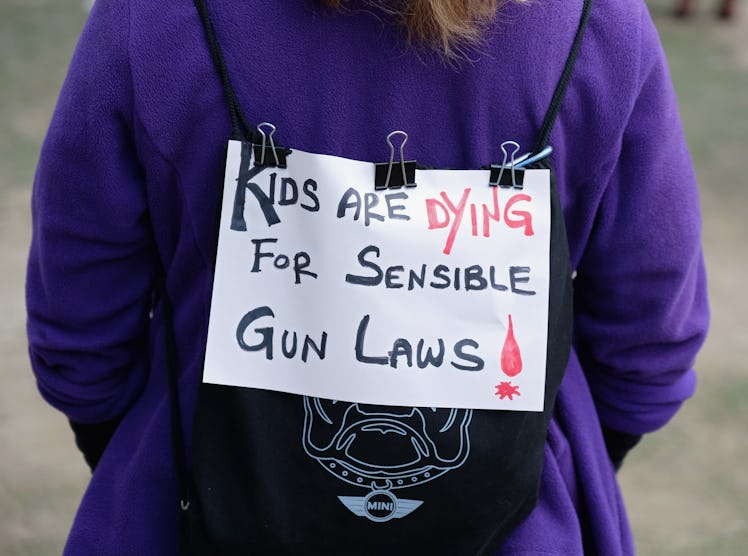
Here's How Gun Control Will Show Up On Your Ballot, So You Can Vote Your Conscience
The topic of gun violence is again on Americans' radars after another mass shooting at a synagogue in Pittsburgh over the weekend. Having taken place just over a week before Election Day, the shooting has ignited anew the conversation around how to prevent shootings like this from happening again. As you prepare to fill out your ballot on Nov. 6, here's what you should know about gun control for the 2018 midterm elections.
The Pittsburgh shooting, which claimed 11 lives and injured several others on the morning of Saturday, Oct. 27, was one of nearly 300 mass shootings in the country so far this year, according to the Gun Violence Archive. Following the mass shooting in Parkland, Florida, in February of this year, states across the country enacted 50 laws related to gun control. And on Election Day, voters will again decide the country's future direction on the issue of gun violence.
One state has a ballot measure addressing the issue head-on. Citizen-originated Initiative 1639 in Washington state includes provisions like raising the age limit to purchase semiautomatic rifles to 21, increased background checks and waiting periods on purchase, and increased requirements for firearm storage.
The initiative, certified in late July, was challenged in three lawsuits, including one by the National Rifle Association (NRA). However, in August, the state Supreme Court upheld the initiative and allowed it to proceed to the November ballot. Elite Daily reached out to the NRA for comment on the legislation but did not hear back by the time of publication.
It wouldn't be the first time the state enacts such legislation, but in getting on the ballot in just a few months, the breakneck legislative pace is a promising indicator — this rapid response to the #NeverAgain movement and the February tragedy that precipitated it signals the broader capacity for the electorate to take swift action.
Elite Daily spoke with Matt McTighe, Chief Operating Officer of Everytown for Gun Safety, about the Washington measure and the role gun control will have on next week's elections around the country.
"It does speak to a nationwide willingness to take action on gun safety where the federal government has failed to act," McTighe says of the Washington initiative. "What's most encouraging is that it is being done in a bipartisan way — it's not just blue states, Democrats, liberals." Some 14 of those states that enacted gun control laws in the last year did so under Republican leadership.
But while Washington is the only state to have direct legislation facing voters, that doesn't mean that the issue of gun control is absent from the election next week.
"Quite frankly, we like to think of the ballot initiative process as sort of a last resort," McTighe adds. "In most states, the best way to move forward is by electing ... leaders that’ll actually do something about this," McTighe says. In fact, aside from ballot measures, candidates are actually a pretty effective means of creating change on the issue — precisely because they're not limited to a narrow set of changes.
"Citizens initiatives can only tackle one issue," he explains. "Lawmakers can do so much more." To help voters ensure they're placing people into power who will carry the issue, Everytown, in conjunction with Moms Demand Action, has implemented an advocate award system that designates candidates as "Gun Sense" champions. (Voters can look up who these candidates are in the own area.)
In fact, one of the biggest indicators that change is afoot may be in the number of politicians and candidates who are not backing away from the controversial issue but signing their names to a stance. Take the Gun Sense distinction: "We thought we'd get 500 candidates," McTighe says of the feature. "We've had more than 3,000 candidates receive the distinction that are now running very openly as Gun Sense candidates."
"If you elect Gun Sense champions this November, you can hold them accountable," he adds. As the saying goes, "Personnel is policy."